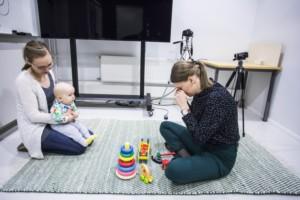Mikko Peltola (PhD, Senior Research Fellow) works at the Human Information Processing laboratory at the Faculty of Social Sciences, Tampere University. Mikko is especially interested in the emotional and social development in early childhood.
After his post-doctoral fellow years in Leiden, Mikko returned to Tampere in 2014, and has worked at the HIP laboratory, led by Professor Jari Hietanen, ever since. What interests Mikko specifically is how infants process facial emotions during the first year and how individual differences in infants’ attention to faces and emotions predict their later social and emotional development.
What does the research look like then? The latest research project, “Empathy in Early Childhood” led by Mikko describes this quite well. Because infants are able to show signs of empathy towards others’ distress, this study aimed to find out whether individual differences in infants’ empathy are associated with later emotional development. The focus was also on the reactions of the babies to different facial expressions using e.g. eye-tracking technology; is infants’ attention to faces and facial emotions at the early stage connected to the development of empathy in later childhood. This study also used the help of parents, who evaluated how their child’s emotional skills are developing.
The TransParent project, on the other hand, focuses on becoming a parent because “Across the adult life course, becoming a parent may be the most transformative experience. The transition to parenthood is associated with major hormonal, neural, and psychological changes which may be important for the adaptation to the challenges of parenting.” (Excerpt from the project description). This project aims to investigate changes in the behavioural, physiological, and hormonal responses to infant and adult social signals during the transition to parenthood. The project compares couples with and without children of their own as to how they react to different emotional states of children. These studies aim to determine if reactions to children’s emotions are associated with experience and duration of parenthood and interaction between the parent and the child.
 Infants’ empathic concern is assessed with a pain simulation paradigm (Picture: Jonne Renvall)
Infants’ empathic concern is assessed with a pain simulation paradigm (Picture: Jonne Renvall)
Although this type of research is very interesting, it does come with some challenges. For the most part, these studies cannot be conducted remotely, or as questionnaires, but the subjects must be physically present when the studies are conducted. Therefore, data collection is slower and the number of subjects in studies more limited, in comparison to e.g. questionnaire-studies. On the other hand, the reliability of the results is increased due to the continuous presence of the researcher during the experiments, and the reliability is increased even further thanks to the technologies available for the research. For example, automatic systems for eye-tracking, EEG-measurements and measuring other normal physiological reactions such as heart rate, increase the objectivity of the results.
Mikko already has a nice national network, working together with people from e.g. Turku and Jyväskylä Brain & Mind networks. Collaboration with Turku includes the FinnBrain project, and Jyväskylä is an essential link in the chain thanks to their specialised knowledge on MEG-measurements. In addition, there is also collaboration within Tampere, e.g. with engineering (signal processing) and child psychiatry.
- Neurocenter Finland is doing a valuable job in enhancing the visibility of researchers, as well as helping researchers to find new collaborators, Mikko comments.
For more information, please visit:
Mikko Peltola | Tampere universities
Transparent | Human Information Processing Laboratory
Empathy in Early Childhood | Human Information Processing Laboratory
https://research.tuni.fi/tampere-ias/
Tampere Brain & Mind is part of a nation-wide Neurocenter Finland researcher network. For more information, please visit www.neurocenterfinland.fi
Images: Jonne Renvall

